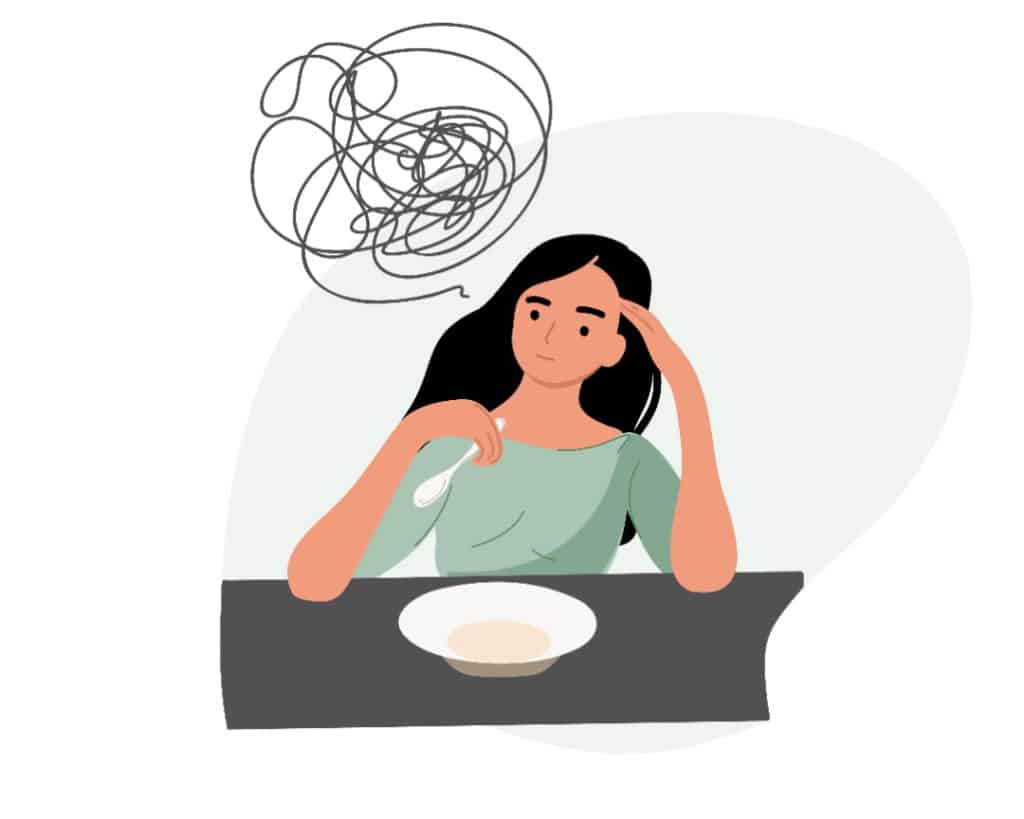What to Look For If You Think Your Child May Have An Eating Disorder
Many people think of eating disorders as a teenage problem. The adolescent years are a time of change and growth, which can make them susceptible to developing eating disorders. Yet, many children develop disordered eating patterns before their adolescent years. If you have concerns about your child, below are seven symptoms to look out for.
Abnormal Weigh Loss and Appearance Changes
Healthy children’s and teens’ weight can fluctuate, especially with growth spurts around puberty. But these changes are typically on a steady trajectory upward as the child grows. If your child or teen experiences abnormal weight gains or weight loss, it may be worth paying attention to. Other eating disorder symptoms include lethargy, dizziness, fainting, hair loss, or digestive issues.
Sudden Interest In Being Healthy or Having A Specific Nutrition Plan
All parents want their children to eat a nutritional, well-balanced diet. But an excessive adherence to healthy foods or a diet plan can be a sign that your child is struggling with restrictive patterns. This is important if it’s accompanied by other symptoms on this list. While being healthy is important, diets should be flexible, allowing for occasional treats. It can be a red flag if your child struggles with that flexibility.
Avoidance of or Anxiety Around Family Meals
Family meals can be a time for connection and bonding, as well as accountability and support for balanced eating patterns. If your child or teen avoids eating with others or appears anxious when eating in a group, this can be a sign of disordered patterns. It’s also a warning sign if your child becomes anxious about the types/amounts of food or appears to pick at or avoid eating foods they used to enjoy.
Missing or Hidden Food
Not all eating disorders involve restriction or avoiding eating. Sometimes children or teens who struggle with binging patterns will hide or sneak food when they believe others won’t notice. You may notice items missing from your pantry or fridge, empty wrappers in the trash, or find a stash of treats. While you may not see your child overeating, these signs could indicate emotional or binge eating in secret.
Increased and Compulsive Exercise
As with nutrition, exercise and physical activity are both important parts of health and well-being. Yet, strict adherence to an exercise regimen can be an indicator of disordered thought patterns. Those with eating disorders exercise to control weight. But exercise can become an addiction and compulsive activity for its own sake. If your child fixates on exercise, exercises excessively, or becomes anxious if they can’t exercise, this could be a sign of disordered eating.
Changes in Mood or Increased Secretive Behavior
Most teenagers experience mood swings along with a desire for independence as part of their development. But if your child or teen is acting depressed, secretive, or irritable, it could be a sign of something deeper. This may be true if your child isolates from their friends or is anxious for no reason.
Increased Focus On Their Appearance
It’s not unusual for teens to be self-conscious and, at times, feel insecure. But if they spend a lot of time looking in the mirror, talking about weight, or weighing themselves, this can signify a problem. Your child may be at risk if they’ve been bullied because of their weight or if they have close friends who talk about weight a lot.
How to Support a Loved One with an Eating Disorder
- Express Your Concerns Gently: Approach your loved one with empathy and express your concern for their well-being. Use “I” statements to avoid sounding accusatory, such as “I’ve noticed you seem different lately, and I’m worried about you.”
- Educate Yourself: Learn about different types of eating disorders, their causes, and potential treatment options. This knowledge will help you support and understand what your loved one is going through.
- Encourage Open Communication: Create a safe, non-judgmental space for your loved one to share their feelings and experiences. Let them know you are there to listen and support them without judgment.
- Avoid Making Comments About Appearance: Refrain from commenting on your loved one’s appearance or making remarks about weight or body shape. Instead, emphasize your concern for their overall health and well-being.
- Be Patient and Understanding: Recovery from an eating disorder is a gradual process that requires time and professional support. Be patient with your loved one and acknowledge the challenges they may face on their journey to recovery.
- Encourage Professional Help: Suggest seeking professional assistance from medical and mental health professionals who specialize in eating disorder treatment. Offer to help research treatment options or accompany your loved one to appointments.
- Promote a Positive Body Image Environment: Foster a positive and supportive environment at home by promoting a healthy body image and emphasizing the importance of self-love and acceptance. Encourage activities that focus on well-being rather than appearance.
- Involve the Family in the Recovery Process: Eating disorders can impact the entire family. Involving family members in the recovery process can provide additional support and strengthen familial bonds.
- Attend Support Groups Together: Consider attending support groups or therapy sessions designed for individuals and families dealing with eating disorders. Connecting with others who have similar experiences can be comforting and informative.
- Celebrate Non-Appearance Achievements: Shift the focus from appearance to achievements that are unrelated to physical attributes. Celebrate personal growth, accomplishments, and moments of joy, reinforcing the importance of well-rounded self-worth.
Watching for these symptoms is the first step toward addressing any problem behaviors. If your child develops disordered eating patterns, it can be scary and overwhelming. If you think your child may have a problem, call 419-885-8800 to contact our compassionate team at Toledo Center. We’re here to help you and your family.

